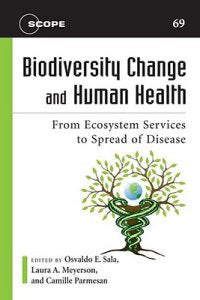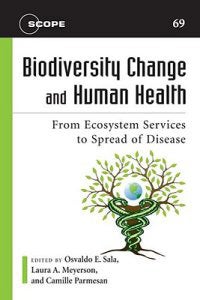 KINGSTON, R.I. – March 6, 2009 – Laura Meyerson, assistant professor of natural resources science at the University of Rhode Island, is the co-editor of a new book that explores the links between human-caused alterations of biodiversity and the impacts of those changes on human health.
KINGSTON, R.I. – March 6, 2009 – Laura Meyerson, assistant professor of natural resources science at the University of Rhode Island, is the co-editor of a new book that explores the links between human-caused alterations of biodiversity and the impacts of those changes on human health.
Biodiversity Change and Human Health: From Ecosystem Services to Spread of Disease brings together experts from a multitude of disciplines to synthesize what is known about the topic and provide a blueprint for how to address the issues in the future. Meyerson’s co-editors are Professor Osvaldo Sala of Brown University and Associate Professor Camille Parmesan of the University of Texas.
“This is an important and neglected topic,” said Meyerson, a resident of Kingston. “We get a great many benefits from the services provided by biodiversity, including fuel, medicines and food, and we depend on nature for our psychological and spiritual well-being as well. Yet we are negatively impacting biodiversity in many, many ways.”
Meyerson is the co-author of three of the sixteen chapters in the book, and her husband Fred Meyerson, also a URI assistant professor, co-authored one chapter.
One of a series of titles published by Island Press and the Scientific Committee on Problems of the Environment, the book is divided into five parts: health trade-offs between competing uses of biodiversity; relationships between biodiversity and quality of life; the effects of changing biodiversity on ecosystem services and how they have affected human health; the role of biodiversity in the spread of infectious diseases; and native biodiversity as a resource for traditional and modern medicine.
Meyerson’s research focus, and the focus of her interest in the book, involves the impact of invasive species on biodiversity and human health.
“The U.S. spends more than $100 billion per year managing invasive species,” she said. “Introduced organisms – whether they are plants, animals or microorganisms — cause harm to the economy, the environment and human health. They cause local extirpations that create a more homogenized ecosystem. Invasive weeds, for instance, reduce food productivity and grazing, impacting our food security and requiring the use of pesticides.”
Meyerson also points to the Irish Potato Famine, which was caused by an introduced fungus, and the loss of the American chestnut tree, caused by an introduced blight that led to a change in the structure of forests and loss of an important food resource. She also notes that climate change is having a serious affect on how and where plants and animals live in the environment.
“It is allowing pests and pathogens to expand their ranges to regions that aren’t prepared to deal with them,” Meyerson said.
Meyerson has been selected one of 19 Aldo Leopold Leadership Fellows by the Aldo Leopold Leadership Program at Stanford University, a competitive fellowship for outstanding academic environmental scientists who are engaged in outreach to decision-makers and the public about their work. As a 2009 fellow, she will receive two weeks of intensive communication and leadership training to help her deliver scientific information more effectively to journalists, policymakers, business leaders, and the public.
“It is critically important to communicate to the public and policy-makers the vital role biodiversity plays in our everyday lives,” Meyerson said. “Our lives depend on biodiversity, and we don’t even know what we’re losing when it disappears.”
Biodiversity Change and Human Health: From Ecosystem Services to Spread of Disease is available from Island Press, Amazon.com, and other online booksellers.

